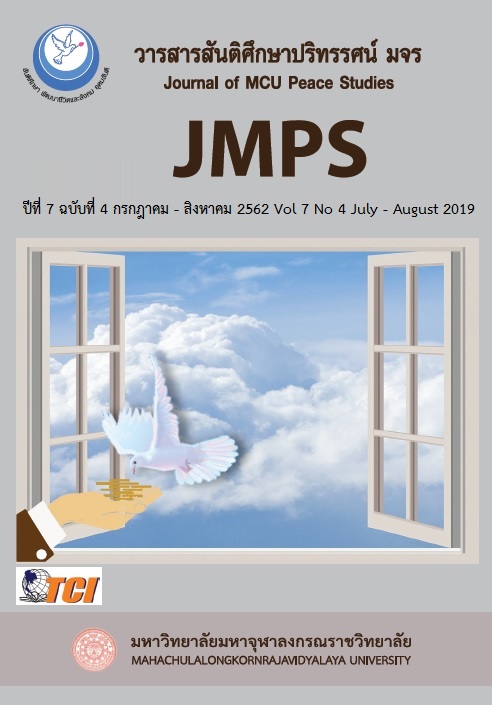การพัฒนาคุณภาพเยาวชนไทยเพื่อสังคมในอนาคตผ่าน กระบวนการค่ายภาษาอังกฤษ*
Main Article Content
บทคัดย่อ
บทความวิจัยนี้นำเสนอผลการจัดกิจกรรมการเรียนรู้เพื่อพัฒนาเยาวชนให้มีความสามารถทาง ภาษาอังกฤษ และเป็นคนที่มีคุณภาพ มีคุณธรรม มีความสุข อันจะส่งผลให้สังคมไทยดีกว่าเดิม โดยนำเสนอ ผลการศึกษาวิจัยเรื่อง การศึกษาการใช้ภาษาอังกฤษของนักเรียนระดับประถมศึกษาผ่านกระบวนการค่าย ภาษาอังกฤษ ซึ่งมีวัตถุประสงค์ 4 ประการ คือ 1) เพื่อศึกษาความสามารถในการใช้ภาษาอังกฤษของ นักเรียนในระดับประถมศึกษา 2) เพื่อศึกษาทัศนคติและทรรศนะของนักเรียนต่อการเรียนรู้ภาษาอังกฤษ ด้วยกระบวนการค่ายภาษาอังกฤษ 3) เพื่อศึกษาทรรศนะของครูที่มีต่อพฤติกรรมของนักเรียนในการเข้าร่วม กิจกรรมตามกระบวนการค่ายภาษาอังกฤษ และ 4) เพื่อศึกษาพฤติกรรมของนักเรียนในการเข้าร่วมกิจกรรม ค่ายภาษาอังกฤษ ผลการวิจัย พบว่า 1) นักเรียนระดับประถมศึกษามีการพัฒนาความสามารถในการใช้ภาษา อังกฤษสูงขึ้น 2) นักเรียนระดับประถมศึกษามีระดับทัศนคติดีต่อการเรียนรู้ภาษาอังกฤษทั้งก่อนและหลัง การเรียนรู้ผ่านกระบวนการค่ายภาษาอังกฤษสูงขึ้น 3) นักเรียนมีทรรศนะต่อการเข้าร่วมกิจกรรมตามกระบวนการค่ายภาษาอังกฤษ 3 ประการ ได้แก่ มีแรงจูงใจในการเรียนรู้ ได้พัฒนาทักษะในการเรียนรู้คำ ศัพท์ และการเรียนรู้เกิดจากการมีปฏิสัมพันธ์ในค่ายภาษาอังกฤษ 4) ครูมีทรรศนะเกี่ยวกับพฤติกรรมการ เรียนรู้ของนักเรียนระหว่างการร่วมกิจกรรมเตรียมความพร้อมก่อนเข้าค่ายภาษาอังกฤษและระหว่างร่วม กิจกรรมค่ายภาษาอังกฤษในระดับมาก และ 5) นักเรียนสามารถเรียนรู้จากกระบวนการค่ายภาษาอังกฤษ 3 ลักษณะ ได้แก่ แบบตาดู แบบหูฟัง และแบบการเคลื่อนไหวทางกาย
Article Details
ทัศนะและความคิดเห็นที่ปรากฏในบทความในวารสาร ถือเป็นความรับผิดชอบของผู้เขียนบทความนั้น และไม่ถือเป็นทัศนะและความรับผิดชอบของกองบรรณาธิการ ยินยอมว่าบทความเป็นลิขสิทธิ์ของวารสาร
References
Baloche, L. (1988). The Cooperative classroom: Empowering learning. Upper Saddle River, New Jersey: Prentice-Hall.
Brown, H. D. (2000). Principles of language learning and teaching. New York: Addison Wesley Longman.
Bureau of High School Education, Bureau of the Basic Education Committee, Ministry of Education. (2015). Guidelines on learning skill management in the 21st century focusing on professional branch competencies. Bangkok: The Agricultural Cooperative Federation of Thailand Publishing, Ltd.
Bureau of the Basic Education Committee, Ministry of Education. (2014). Practice guidelines according to the announcement of Ministry of Education on policy and reformation of English teaching and learning. Bangkok: Jamjuree Products Co., Ltd.
Bureau of the National Education Committee. (1999). Act of National Education B.E. 2542. Bangkok.
Davidson, N. (1994). Cooperative and collaborative learning: An integrative perspective. In J. S. Thousand, R. A. Villa & A. I. Nevin (Eds.), Creativity and collaborative learning: A practical guide to empowering students and teachers. Baltimore, Maryland: Paul H. Brookes.
Department of Curriculum and Instruction Development, Ministry of Education. (2001). Manual of knowledge in the essential group of foreign languages. Bangkok.
Dornyei, Z. & Murphey, T. (2003). Group dynamics in the language classroom. Cambridge: Cambridge University Press.
Ellis, R. (1994). Second language acquisition. Oxford: Oxford University Press.
Gardner, R. & Lambert, W. (1972). Attitudes and motivation in second-language learning. Rowley, MA: Newbury House.
Gower, R. Phillips, D. & Walters, S. (1995). Teaching practice handbook. Oxford: Heinemann.
Harmer, J. (1991). The practice of language teaching. London: Longman.
Harmer, J. (2007). The practice of English language teaching. Essex: Pearson Education.
Hughes, G. & Moate J. (2007). Practical classroom English. Oxford: Oxford University Press.
Johnson, R. T., & Johnson, D. W. (1994). An overview of cooperative learning. In J. S. Thousand.
Villa R.A. & Nevin A.I. (Eds.). Creativity and collaborative learning. Baltimore, Maryland: Paul H. Brookes.
Kessler, C. (1992). Cooperative language learning. Englewood Cliffs, New Jersey: Prentice-Hall.
Klanrit, P. (2005). Communicative activities for developing English speaking proficiency in Thailand. Unpublished doctoral dissertation, The University of Melbourne, Melbourne, Australia.
Krashen, S. D. (1981). Second language acquisition and second language learning. Oxford: Pergamon Press.
Kullavanich, P. (2006). Research on the root of foreign languages. Bangkok: Institute of Research Promotional Fund.
McKay, P. (2006). Assessing young language learners. Cambridge: Cambridge University Press.
Miles, M.B. & Huberman, A.M. (1984). Qualitative data analysis: A sourcebook of new methods. California: SAGE Publications.
Oxford, R. (1990). Language learning strategies: What every teacher should know. New York: Newbury House.
Prapaisit, L. (2003). Changes in teaching English after the educational reform in Thailand.
Unpublished doctoral dissertation, Michigan State University, Michigan, The United States of America.
Ryan, K., Cooper, J. & Tauer, S. (2013). Teaching for student learning: Becoming a master teacher. Belmont, CA: Wadsworth, Cengage Learning.
Sanyawiwat, S. (2008). Theories and strategies of social development. Bangkok: Chulalongkorn University Publishing House.
Sharan, S. (1994). Cooperative learning and the teacher. In S. Sharan (Ed.), Handbook of cooperative learning methods. Westport, CT: Greenwood.
Stewart, W. (1968). A sociolinguistic typology for describing national multilingualism. In J.A.
Fishman (Ed.), Readings in the Sociology of Language. The Hague: Mouton.
Strauss, A. & Corbin, J. (1998). Basics of qualitative research: Techniques and procedures for developing grounded theory. Thousand Oaks, California: Sage.
Suweerangkool, S. (2008). Social problems. Bangkok: Odeon Store.

